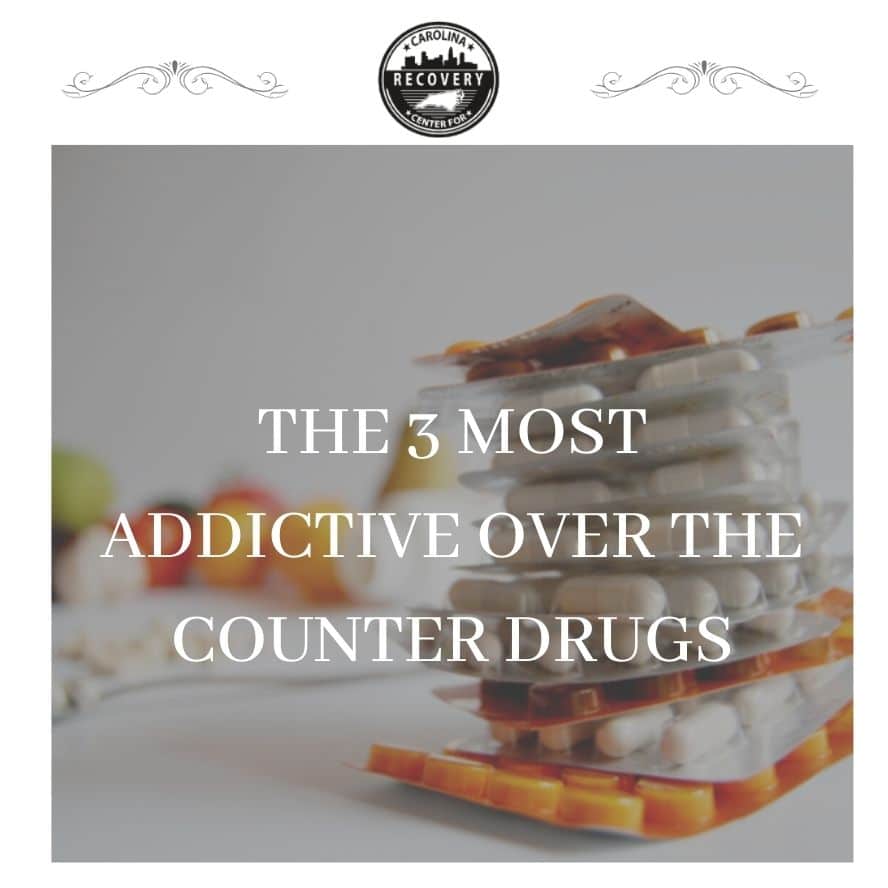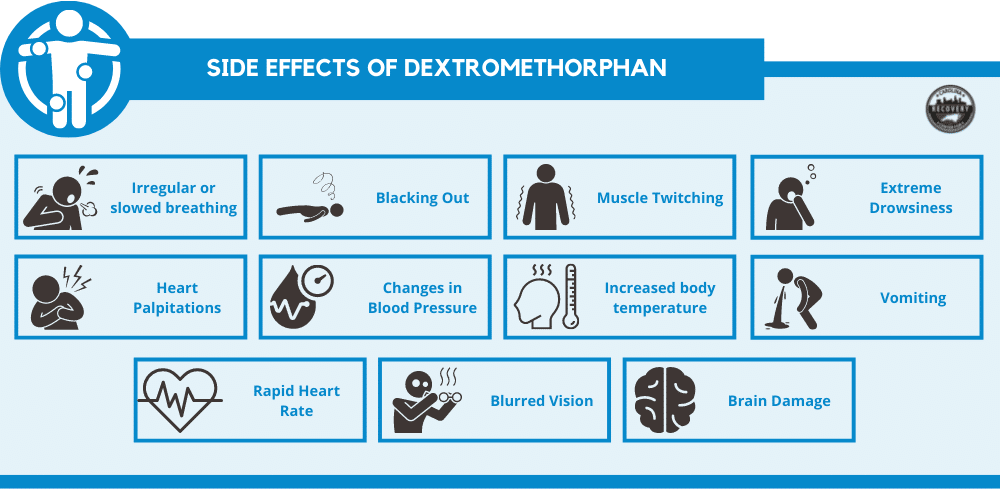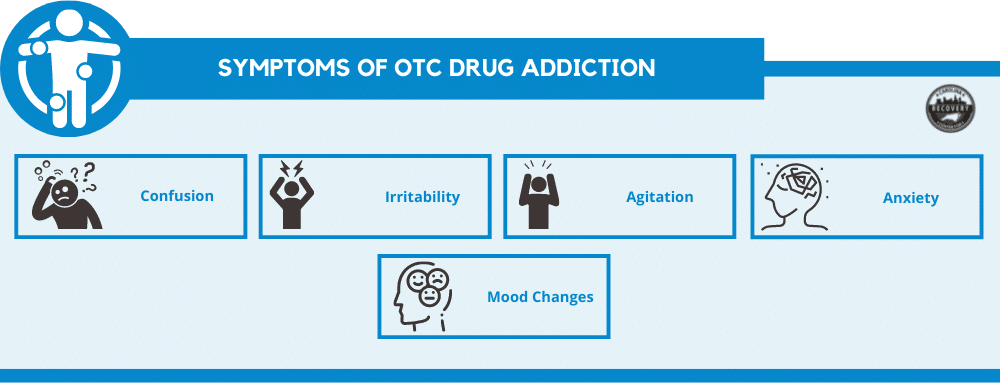The 3 Most Addictive Over the Counter Drugs

Medically Verified: 2/1/24
Medical Reviewer
Chief Editor

All of the information on this page has been reviewed and verified by a certified addiction professional.
Over the counter (OTC) drugs are seemingly innocent medications that individuals acquire without a prescription at drugstores or supermarkets. While OTC drugs are considered safe when taken in moderation and at recommended doses, some have the potential for abuse. Typically, individuals abuse prescription medications at a higher rate than OTC medications. However, people who do not have access to prescription drugs may begin to abuse over the counter medications.
While over the counter medications are less potent than prescription drugs, abuse and addiction are possible. Unfortunately, abusing OTC medications may lead to severe health complications, such as memory loss, kidney failure, heart problems, and even death. The 3 most addictive over the counter drugs include cough medications, cold medicines, and motion sickness pills. If someone you love is struggling with an addiction to over the counter drugs, contact a treatment provider for help in finding treatment.
Over-the-Counter Drug Abuse
Over the counter drugs have various medicinal uses, including treating mild pain to motion sickness. Sometimes, individuals abuse OTC drugs as a way to self-medicate mental illnesses like anxiety or depression. However, other individuals may abuse these drugs to achieve a euphoric or hallucinogenic “high”. To be specific, over the counter drug abuse is considered taking anything over the recommended dose.
With that being said, let’s take a look at the 3 most addictive over the counter drugs and their effects.
#1. Cough Medicines (Dextromethorphan, or DXM)
One of the most commonly abused over the counter medications are cough medicines containing Dextromethorphan (DXM). This is because, in high doses, DXM may cause a potent high and hallucinations. Cough medicine abuse is popular among young people, as these drugs are often readily accessible among medicine cabinets at home.
The Drug Enforcement Administration (DEA) created a list of different dose-dependent plateaus, describing the effects of DXM abuse. The maximum daily dose of DXM is 120mg. If an individual takes more than 120mg a day, they will begin to experience intoxication and dangerous side effects.
According to the DEA:
- A dose of 100-200 mg induces mild stimulation and euphoria
- Doses of 200-400 mg lead to stronger euphoria and hallucinations
- A dose of 300-600 mg causes loss of motor coordination and visual distortions
- Doses of 500-1500 mg lead to out-of-body sensations
Individuals who take high doses of cough medicines containing dextromethorphan may experience:

- Irregular or slowed breathing
- Blacking out
- Muscle twitching
- Extreme drowsiness
- Heart palpitations
- Changes in blood pressure
- Increased body temperature
- Vomiting
- Rapid heart rate
- Blurred vision
- Muscle twitching
- Brain damage
#2. Cold Medicines (Pseudoephedrine)
Next on the list of the most addictive over the counter drugs are cold medicines containing pseudoephedrine. Pseudoephedrine is a stimulant substance and the active ingredient in many OTC cold medicines. Typically, these drugs are used to treat sinus congestion from allergies or colds.
Sometimes, individuals abuse cold medicines to experience hallucinations or intense body highs. On the other hand, these OTC drugs may be used in the manufacturing of illicit substances such as methamphetamines. Unfortunately, individuals who abuse pseudoephedrine may experience adverse side effects such as irregular heartbeat, shortness of breath, high blood pressure, dizziness, and seizures.
#3. Motion Sickness Pills (Dimenhydrinate)
Dimenhydrinate is a substance found in motion sickness pills, designed to treat motion sickness and vertigo. Sadly, this over the counter drug has the potential for abuse and addiction. In high doses, this medication may cause hallucinations, ringing in the ears, nausea, irregular heartbeat, seizures, coma, and even death. Typically, people abuse motion sickness pills for their psychedelic properties. Dimenhydrinate is considered a deliriant when taken in high doses (between 200-1200 mg depending on body weight).
Symptoms of OTC Drug Addiction
Individuals who are addicted to over the counter drugs may face alterations in their brain chemistry over time. Eventually, the individual will build a tolerance to the drug, causing them to need more of the substance to create the desired effect. Also, individuals addicted to over the counter drugs might face withdrawal symptoms after they cease use.
Common symptoms of OTC drug addiction include:

- Confusion
- Irritability
- Agitation
- Anxiety
- Mood changes
Spotting abuse of any of the most addictive over the counter drugs may be difficult because of the difference in severity when comparing cough medicine addiction to opioid addiction. Additionally, people do not always view OTC drugs as addictive, allowing individuals to abuse OTC medications without sparking concern. If you or a loved one is addicted to over the counter drugs, addiction treatment is necessary.
Treatment for OTC Drug Addiction
Overcoming an OTC drug addiction might be difficult, but recovery is possible with professional intervention. Inpatient rehab treatment programs provide recovering patients with 24-hour medical care, while individuals in outpatient programs visit specified medical centers while residing at home. Additionally, attending a 12-step group like Narcotics Anonymous provides recovering addicts with community and support to help create lasting recovery. If you or a loved one is struggling with an addiction to over the counter drugs, contact a treatment provider to learn about available treatment options.

